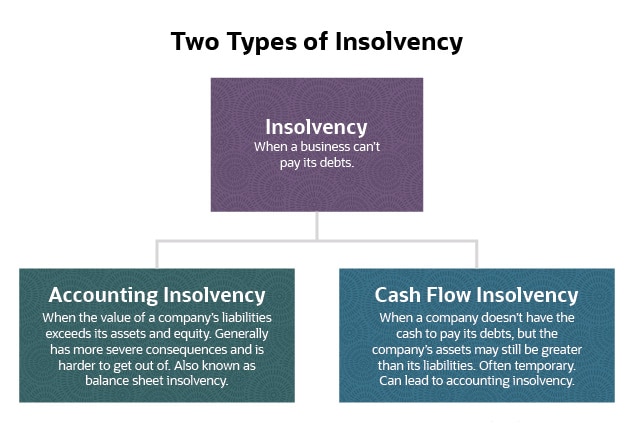Excitement About Insolvency Practitioner
Excitement About Insolvency Practitioner
Blog Article
The Ultimate Guide To Insolvency Practitioner
Table of ContentsRumored Buzz on Insolvency PractitionerThe 2-Minute Rule for Insolvency PractitionerThe Only Guide for Insolvency PractitionerSome Known Questions About Insolvency Practitioner.The smart Trick of Insolvency Practitioner That Nobody is DiscussingSome Known Details About Insolvency Practitioner More About Insolvency Practitioner
Insolvency is when obligations are higher than the value of the business, or when a debtor can not pay the financial obligations they owe. A company can end up being financially troubled as a result of a variety of circumstances that result in inadequate capital. When confronted with insolvency, a business or individual can speak to financial institutions directly and restructure financial obligations to pay them off.
Organization owners may call financial institutions directly and restructure financial debts into more workable installations. Lenders are normally responsive to this technique since they desire to be paid back and prevent losses, even if the settlement is on a delayed schedule.
The proprietor produces a proposition detailing how the financial obligation may be reorganized using expense reductions or various other strategies for support. The proposition shows lenders how business may create sufficient cash money flow for lucrative procedures while paying its debts. Normally, a forgiven financial obligation might be taken into consideration revenue by the Internal Revenue Service (INTERNAL REVENUE SERVICE).
Some Of Insolvency Practitioner
When a service needs to pay boosted costs for goods and services, the business passes along the expense to the consumer. As opposed to pay the enhanced price, many customers take their company elsewhere so they can pay much less for a service or product. Losing customers leads to shedding revenue for paying the business's lenders.
Business may finish up paying big amounts of cash in damages and be incapable to continue operations. When operations stop, so does the business's earnings. Absence of income results in accounts payable and lenders requesting cash owed to them. Some business become financially troubled due to the fact that their goods or services don't evolve to fit consumers' changing demands.
The Main Principles Of Insolvency Practitioner
Expenditures exceed earnings and bills stay overdue. Cash-flow insolvency occurs when a firm has the assets to cover their financial obligations however they are in the incorrect type, such as real estate rather of liquid funds. Balance-sheet insolvency, on the various other hand, suggests a lack of properties in any type to cover debts.
The IRS states that a person is bankrupt when the overall obligations exceed total possessions. Insolvency Practitioner. A personal bankruptcy, on the various other hand, is an actual court order that shows exactly how a financially troubled person or service will certainly pay off their lenders, or how they will market their properties in order to make the settlements
Insolvency Practitioner Things To Know Before You Get This
When a firm or individual is financially troubled, they can not satisfy their financial obligations. Insolvency is not the very same as insolvency, although a firm that has ended up being financially troubled may file for personal bankruptcy. Insolvency is the state of not being able to pay your responsibilities while insolvency is a lawful process to discharge your debts.
Comprehending the factors that can result in insolvency, such as overspending, Learn More can help you protect against bankruptcy and its effects.
The Ultimate Guide To Insolvency Practitioner
It is well known that check that supervisors and police officers of corporations (and managers of restricted obligation companies) owe fiduciary responsibilities to their organizations and their investors (or members). These fiduciary commitments are defined by state laws and, though there are variations from one state to another, they normally consist of a task of commitment and an obligation of care.
The responsibility of treatment needs supervisors and police officers to work out persistance, to make enlightened decisions, and to act in excellent belief to ensure that their actions remain in the most effective passion of the company. Beyond the range of this conversation, some states allow these obligations to be limited either by so noting in the organizational files or conforming with other requirements.
Unknown Facts About Insolvency Practitioner

Be careful regarding offering shareholders advantageous treatment at the expense of creditors (e.g., accrediting and moneying a dividend or a supply redemption). Beware about favoritism between courses of investors. Clear up efforts to find out all the realities before taking a specific course of action; supervisors should genuinely think that any decisions made are in the most effective interests of the firm in its entirety (i.e., decisions will be evaluated in knowledge in light of the effect of such activities on the company).
In any kind of insolvency or insolvency proceeding, settlements made to certain creditors at the expense of other creditors can be clawed back, particularly if there is some connection between the firm and the financial institution. Think about suggesting at an annual investor meeting (or any kind of various other meeting of shareholders) a resolution attesting that all previous business choices and actions taken by the informative post supervisors and policemans of the firm were taken in good confidence after an exercise of reasonable care.
The Definitive Guide for Insolvency Practitioner
Fully disclose any type of individual or service relationships with events beyond of transactions entailing the corporation to avoid the appearance of a dispute of rate of interest. In examining potential fund raising purchases or a sale of properties of the distressed company, realize that these purchases might be scrutinized later due to any type of succeeding expansion of directors' fiduciary tasks to consist of financial institutions.
Report this page